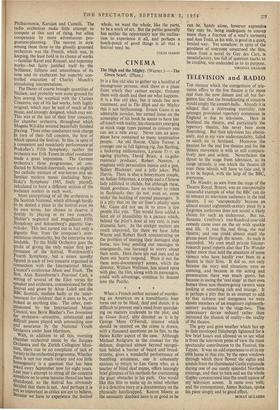CINEMA
The High and the Mighty. (Warner.)—The Green Scarf. (Plaza.) IT is a fine old idea to gather up a handful of incongruous persons, stick them in a place from which they cannot escape, threaten them with death and then see what happens. It is a fine old idea, but it needs line new treatment, and in The High and the Mighty this is not forthcoming. Ernest Gann is an admirable novelist, but turned loose on the screenplay of his book he seems to have lost all touch with reality, his characters emerging as stock stage types painted in colours you can see a mile away. Never can an aero- plane have contained so many unattractive people. An old floozie, Claire Trevor, a younger one in full fighting rig, Jan Sterling, a bickering millionairess, Laraine Dry, an ageing playboy, David Brian, a niLgolo- maniacal producer, Robert Newton, a magnate with persecution mania and a gun, Sidney Blackmer, and a jolly joker, Phil Harris. There is also a honeymoon couple, an Italian fisherman, a cripple and a Chinese lady addicted to clichés, but although these, thank goodness, have no troubles to relate in flashbacks they do not, even so, come under the heading of normal passengers. It is a pity that on the air liner's plushy seats Mr. Gann did not see fit to strew a few people like you. This would have added a faint air of plausibility to a picture which, behind the pilot's door at any rate, is pure dramatic. ham. In the cockpit matters are much improved, for there we have John Wayne and Robert Stark concentrating on the problem of steering their damaged ship home, too busy sending out messages to coastguards, too harassed to worry about their souls. Here there are real men and to them our hearts respond. Were it not for these semi-documentary scenes, which the director, William Wellman, has seized upon with glee, the film, along with its passengers, could with advantage, continue its descent into the Pacific.
• When a French author accused of murder- ing an American on a transatlantic liner turns out to be blind, deaf and dumb, it is difficult to prevent one's mind from speculat- ing on matters irrelevant to the plot, and in Green Scarf, ably directed as it is by George More O'Ferrall, interest which should be centred on the crime is drawn, with a thousand questions on its lips, to the Helen Keller aspect of the case. Although Michael Redgrave as the counsel for the defence, disguised almost beyond recogni- tion behind a barrier of beard and bread- crumbs, gives a wonderful performance of bumbling astuteness, one is constantly anxious to return to Leo Genn who, as a teacher of blind deaf mutes, offers teasingly brief glimpses of his methods for overcoming the giant obstacles in his path. One would like this film to make up its mind whether it is a detective story or a documentary on the physically handicapped. Keiron Moore as the unusually disabled hero is as good as he
can • be, hands alone, however expressive they may be, being inadequate to convey more than a fraction of a soul's torment; and Ann Todd, as his wife, is good in a quiet, limited way. Yet somehow, in spite of the goodness of everyone concerned the film, taken from a novel by Guy des Cars, is unsatisfactory, too full of question marks to be credible, too undecided as to its purpose.
VIRGINIA GRAHAM


































 Previous page
Previous page